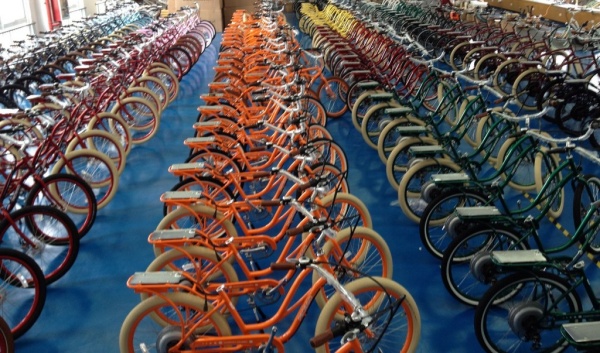Bicycle delivery, or SLOW delivery?
Where are the bigger gains?

Bicycles pollute and occupy space much, much less than private cars, vans, or basically almost any other mean of transportation. Inside cities, bicycles could also deliver parcels, and not just very light ones, in a much “greener” way than any other alternatives. And that is exactly the scenario proposed by J. Thackara, more than six years ago, in “Caloryville: The Two-Wheeled City”.
The problem to solve is that “enormous amounts of energy are wasted shipping objects from place to place”, obviously creating equally great amounts of unnecessary pollution. Examples of how to solve the problem with (electric) bicycles include:
- "The Netherlands: Of the 1,900 vans and trucks that enter the city of Breda (pop: 320,000) each day, less than ten percent of the cargo being delivered really needs to be delivered in a van or truck; 40 percent of van-based deliveries involve just one package."
- Berlin: “85 percent of all deliveries in a city like Berlin could be made by e-bike"
- in general, “50 percent of all parcels delivered in EU cities could be delivered by cargo bike".
As usual, both the sources of such problems and their effective solutions, are not in technology:
“Every city’s mobility ecosystem contains a multitude of economic actors: freight businesses; taxi drivers; courier companies; retailers; hotels and restaurants; emergency services; street traders. How on earth is a city to persuade all these actors to head in the low-calory direction signalled by e-bikes?"
The answer is innovation in _governance, and the article points to several approaches to get there. And yet, focusing on bicycle delivery feels a lot like…
The right way to do the wrong thing
Even ignoring ecology, bicycles would be the only way to make doorstep delivery to many narrow, crooked, medieval urban centers all across Europe.
However, as good and worth pursuing as it is, bicycle-based city-wide delivery of goods only solves the last mile of a much bigger problem that, for a good part, should not exist to begin with: delivery of too many things, too quickly.
To see what I mean, start from almost every electronic gadget from big TVs to webcams, GPS trackers, LED strips and so on: with stuff like that, by far the biggest waste happens BEFORE you buy it. But what is the ecological gain of delivering by bicycle a new smartphone every other year, if each smartphone should last DECADES, to offset its emissions?
The same issue applies, to different degrees, to plenty of other goods, starting from junk fashion. Delivering the same volume of goods as today would do a lot of good to local air pollution and traffic, but nothing at all for waste management.
Then there is the other big problem: truck delivery pollutes when delivers packages one by one, on people doorsteps, as soon as possible. If it stopped being like that, it would pollute way less, and likely also cost less than bicycle delivery.
Change the UPSTREAM rules, not just the means of transportation
Changing city and shipping governance to make bicycle delivery viable is good. But I argue that an “Amazon Prime-like” service done entirely on bicycle would pollute almost as much as a truck-based one, if it became the norm, because it would not decrease consumption of throwaway goods, which is where by far the biggest waste happens.
I argue that, before going full-bicycle, it could be much simpler, greener and much better for people too, as it would reduce impulse shopping, to do something like:
- heavily tax quick, at-your-doorstep delivery, with whatever mean
- impose, or at least strongly support, the “Amazon locker” model: (bi) weekly deliveries, at fixed delivery points in each neighborhood.
Find closed shops, or some unused corner in a farmer’s market or shopping mall, as city-managed pickup location, then change regulations so that ONE, possibly electric truck comes, just once or twice a week, to leave there everything ordered by anybody living or working within e.g. a 500 mt radius. This is what should be bicycle-based deliveries should compete with.
Here is another way to look at the same problem, as final tip for anybody evaluating bicycle delivery policies, or business models, for their city: make sure that your proposal is sustainable with many less doorstep deliveries than today. Otherwise, it will either fail, or accomplish very little in the bigger scheme of things.
Who writes this, why, and how to help
I am Marco Fioretti, tech writer and aspiring polymath doing human-digital research and popularization.
I do it because YOUR civil rights and the quality of YOUR life depend every year more on how software is used AROUND you.
To this end, I have already shared more than a million words on this blog, without any paywall or user tracking, and am sharing the next million through a newsletter, also without any paywall.
The more direct support I get, the more I can continue to inform for free parents, teachers, decision makers, and everybody else who should know more stuff like this. You can support me with paid subscriptions to my newsletter, donations via PayPal (mfioretti@nexaima.net) or LiberaPay, or in any of the other ways listed here.THANKS for your support!